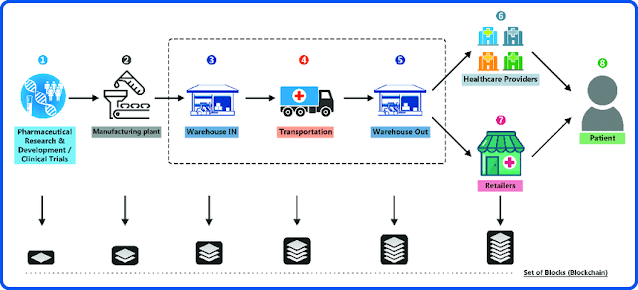In short, a blockchain is a type of database that stores information in blocks which are linked together in a permanent and immutable chain. Each block stores transactional data, time stamps, and cryptographic hashes of previous blocks making it virtually impossible to tamper with records stored on the network. As such, blockchain provides immutability - allowing users to make secure transactions without worrying about their information getting corrupted or stolen.
Additionally, blockchain can also be used for smart contracts by providing users with an efficient way to manage digital agreements in a transparent manner. At its core, blockchain works by storing data across a network of computers using cryptography, enabling it to be secure and virtually impossible to alter or tamper with.
Blockchain also allows for faster transactions since there are no intermediaries involved and multiple parties can work together without having to trust each other. This makes it ideal for applications such as finance, healthcare, supply chain management, insurance and more. Additionally, due to its decentralized nature, blockchain provides higher levels of security than traditional databases as all transactions are recorded on a public ledger which cannot be altered or deleted once added.
Top Six Ways To Use Blockchain
- Financial Transactions
- Digital Identity Verification
- Supply Chain Management
- Data Security & Storage
- Smart Contracts
- Voting Systems
If you are interested in updating your skills in Blockchain Training, our Blockchain Certification Training can help you to enhance your career.
1. Financial Transactions
Blockchain technology is revolutionizing the way we do financial transactions. This innovative new system uses a distributed ledger to securely record and store data, making it an attractive choice for money transfers and other financial interactions. In fact, blockchain-based systems are becoming increasingly popular for their security, immutability, transparency, cost-effectiveness and faster transaction processing times.
An example of a blockchain application used in finance is cryptocurrency. Cryptocurrency is a digital currency that works on the principle of peer-to-peer (P2P) transactions between users without the need for third-party intermediaries like banks or payment processors. All transactions are stored securely on a public ledger that cannot be changed or manipulated; this makes it virtually impossible to commit fraudulent activities like counterfeiting or double spending with cryptocurrencies.
Transactions made through blockchain are immutable and highly secure from fraudulent activities as all data is encrypted in cryptographically secured blocks, which cannot be changed once they have been recorded on ledger systems. Furthermore, these transactions are transparent and offer complete traceability between parties involved in a transaction, eliminating the possibility of any discrepancies or malicious intent during money transfer operations.
2. Digital Identity Verification
In today’s digital world, identity verification is an increasingly vital part of doing business. With the rise of blockchain technology, digital identity verification has become easier and more secure than ever before. Blockchain-based digital identity verifications are a great way to securely identify customers and protect against fraud.
Digital identity verification on the blockchain involves using distributed ledger technology to store data in a secure, encrypted fashion. This ensures that no single entity has access to all the information contained within the ledger, which increases security and privacy.
By leveraging this technology, businesses can ensure they are only providing services or products to legitimate customers while preventing malicious actors from accessing personal data such as passwords or credit card information. Furthermore, blockchain-based digital identities can be used for KYC (Know Your Customer) compliance in financial transactions.
The use of supply chain management in the blockchain is becoming increasingly popular as businesses look to streamline their processes and benefit from the security, transparency, and cost savings that this technology has to offer. By combining two rapidly evolving technologies, companies can gain access to secure, reliable data and automate operations with minimal manual intervention.
3. Supply Chain Management
The use of supply chain management in the blockchain is becoming increasingly popular as businesses look to streamline their processes and benefit from the security, transparency, and cost savings that this technology has to offer. By combining two rapidly evolving technologies, companies can gain access to secure, reliable data and automate operations with minimal manual intervention.
In a traditional supply chain system, product information is stored in multiple systems and locations, making it difficult for companies to track products on a real-time basis. With the introduction of blockchain technology into the supply chain process, all participants along the chain are able to view product information securely and transparently in one shared ledger.
This eliminates any discrepancies between different stakeholders’ records or processes. Additionally, blockchain increases efficiency by reducing paperwork and manual entry errors associated with traditional centralized databases.
Data security and storage are two of the most important components of any blockchain technology. It is crucial to ensure that data remains secure, private and unaltered. With blockchain, users can trust that the data they store is safe from malicious attacks and theft. There are several methods for using data security and storage in a blockchain system.
One method for using data security and storage in a blockchain system involves creating multiple layers of encryption so that only authorized users can access the data stored on the network. This layer of encryption ensures that malicious actors cannot gain access to sensitive information stored on the network.
4. Data Security & Storage
Data security and storage are two of the most important components of any blockchain technology. It is crucial to ensure that data remains secure, private and unaltered. With blockchain, users can trust that the data they store is safe from malicious attacks and theft. There are several methods for using data security and storage in a blockchain system.
One method for using data security and storage in a blockchain system involves creating multiple layers of encryption so that only authorized users can access the data stored on the network. This layer of encryption ensures that malicious actors cannot gain access to sensitive information stored on the network.
Additionally, it helps to protect against potential hackers or other cyber-attacks on the system as each layer must be unlocked with a unique key before access can be granted. Also, you can go through the blog on Blockchain Architecture which would help you enhance your knowledge and career to find the right job.
5. Smart Contracts
Smart contracts have become a popular tool in the blockchain world, allowing users to exchange goods and services without the need for a centralized third party. This type of contract allows for secure and automated transactions between two parties, all while ensuring that the terms of the agreement are carried out as agreed upon.
Smart contracts have revolutionized how businesses interact with customers and other parties, providing a more secure and efficient way to complete transactions. The process of using smart contracts is relatively simple. The two parties involved in the transaction would first agree on what they want to accomplish through this contract.
Once this is established, they create a digital document which outlines all of the predetermined conditions that must be met before any funds or goods can be exchanged. Once these conditions are met, then an automated program takes over and completes all required steps until both parties receive what has been agreed upon.
Voting systems in blockchain can provide a secure and efficient way to manage elections and confidential records. Blockchain technology enables immutable, distributed ledgers of data that are stored across multiple nodes and protected by strong encryption algorithms. Using this technology, voting processes can be simplified while ensuring the integrity of the election results.
6. Voting Systems
Voting systems in blockchain can provide a secure and efficient way to manage elections and confidential records. Blockchain technology enables immutable, distributed ledgers of data that are stored across multiple nodes and protected by strong encryption algorithms. Using this technology, voting processes can be simplified while ensuring the integrity of the election results.
In order to use voting systems in blockchain, voters must first register their identity with a decentralized application (DApp) based on blockchain technology. Upon registration, they will be assigned an individual cryptographic key that ensures their anonymity while allowing them to cast their vote securely.
The DApp then broadcasts the encrypted vote onto the blockchain network where it is stored in blocks across multiple nodes for added security. This allows for easy tracking of votes but keeps all personal information hidden from prying eyes.
In conclusion, blockchain technology is a powerful tool that can be used to improve businesses. From reducing costs and increasing speed to improving data security and providing greater transparency, blockchain technology has the potential to revolutionize business operations. Companies must understand its capabilities and limitations in order to utilize it properly.
Conclusion
In conclusion, blockchain technology is a powerful tool that can be used to improve businesses. From reducing costs and increasing speed to improving data security and providing greater transparency, blockchain technology has the potential to revolutionize business operations. Companies must understand its capabilities and limitations in order to utilize it properly.
With the right strategy, businesses can use blockchain to innovate and stay competitive in their market. Investing in research and development of blockchain solutions is the key for any successful business looking to leverage this technology.

















0 Comments: